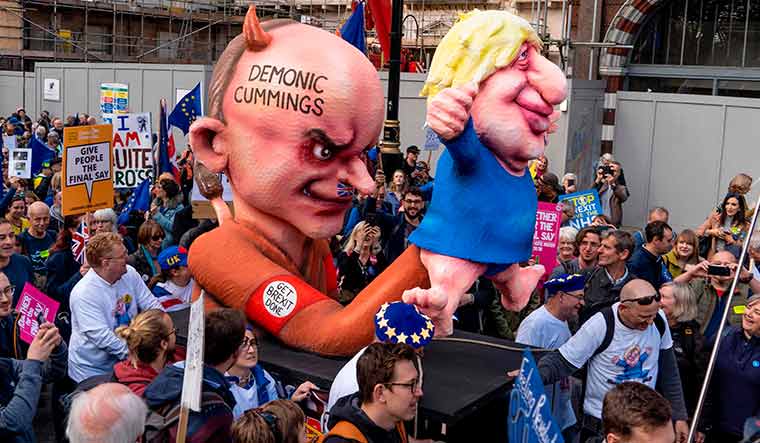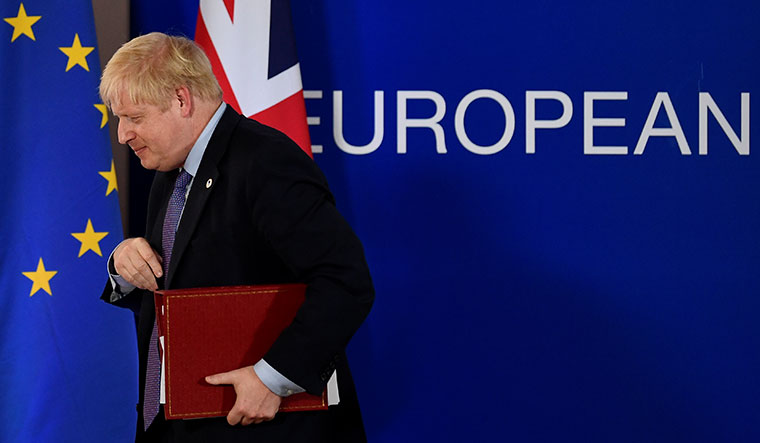Once upon a time, Great Britain ruled the seven seas. Now it is ruled by seven Cs: compromise, customs, consent, competition, cleverness, communications and commerce.
Prima facie, Prime Minister Boris Johnson grabbed a Brexit deal with the European Union from the jaws of defeat, in the nick of time. Fans hail his deal as “brilliant”; opponents say it is a devious compromise, rehashing an old rejected arrangement. His predecessor Theresa May had worked on this proposal, which was first offered by the EU in February 2018. Said political researcher Tom Kibasi, “Not for the first time, a man has taken credit for a woman’s work.”
But May subsequently discarded this proposal because it undermined the UK’s unity and integrity: the UK exits the EU, but Northern Ireland remains within the EU’s customs union. One nation, two systems. May had said, “No UK prime minister can agree to this.” But Johnson did. Northern Ireland’s Democratic Unionist Party that props up Johnson’s minority government felt betrayed. Johnson was “too eager by far to get a deal at any cost”, accused DUP’s deputy leader Nigel Dodds.
Johnson has repeatedly avowed to take the UK out of the EU by October 31. While May looked increasingly isolated during her tenure, Johnson appears like Robin Hood with his merry band of Brexiteer faithfuls spinning a communications yarn about his “simply superb” deal. Last year, Tory Brexiteer Jacob Rees-Mogg mockingly dismissed the “one nation, two system” proposal as “completely cretinous, impractical, bureaucratic and a betrayal of common sense”. Now Rees-Mogg says, “there’s a line from Churchill saying he’d often had to eat his own words and he found it a nourishing diet.”
Johnson, too, has had his bellyful of “nourishing diet”. Despite his repeated refusal, he had to seek a Brexit delay as mandated by British law after the parliament outmanoeuvred him. But his childish trickery and nonsensical tactics provoked alarm in Westminster and European capitals. His official letter seeking Brexit extension was a photostat, short and unsigned. The accompanying letter was long and signed, outlining why an extension should be rejected. Anonymous leaks of false versions of a Johnson-Angela Merkel phone call, pursuing a perfidious blame game with the EU and pitting people against the parliament have led European leaders to believe that “10 Downing Street is out of control”.
While politicians eat their words, Britons have been feeding on a poisonous diet of polarisation, uncertainty and fatigue. Post-Brexit future looks frightening, motivating a million protestors to gather in London demanding a second referendum. But many people are so sick and tired, they support Johnson’s mantra: “Get Brexit Done”. British MPs battled historic choices: delay Brexit to scrutinise Johnson’s deal, hurriedly pass it to keep the October 31 deadline, lose Brexit altogether or crash out of the EU without a deal.
On October 22, the British parliament approved Johnson’s Withdrawal Amendment Bill, but a few minutes later, it rejected another vote which set a rushed three-day timetable to clear the withdrawal bill within the October 31 deadline. As a result, the bill is now officially “in limbo”, according to Speaker John Bercow.
The stumbling block to a Brexit deal has always been the future status of Northern Ireland, the theatre of a 30-year savage war between the Catholic nationalists represented by the Sinn Fein aligned to the neighbouring Republic of Ireland and the protestants represented by the DUP, who wish to remain in union with Britain. The internationally brokered Good Friday Agreement that ended the war in 1998 guarantees an open border between Ireland and Northern Ireland. Johnson’s deal ensures this. Instead of customs controls between Ireland and Northern Ireland, the checks will be between Northern Ireland and the UK. “This is not crossing a red line, this is crossing a blood red line,” said DUP leader Arlene Foster.
The deal’s legalese is crafty more than statecraft. Northern Ireland is part of the EU’s customs union, but it remains in the UK’s customs territory—de jure with the UK, but de facto in the EU. Northern Ireland’s unionists fear the deal’s natural gravitational pull will drag their homeland away from Britain into Ireland, paving the way for the reunification of Ireland and Northern Ireland.
Northern Ireland’s people must agree to any deal. In Johnson’s original proposal, the DUP on its own could veto any agreement. But he gave in to the EU’s clever change, which stipulated that a simple majority in Northern Ireland’s legislature was needed for a veto. Such a veto is unlikely because nationalists have electoral and demographic majority, further isolating and weakening the unionists. To minimise, if not avoid smuggling and unfair competition, the deal includes a cumbersome system whereby foreign or British goods heading to the EU via Northern Ireland will be levied the EU’s value added tax. But it will be reimbursed if the goods remain in Northern Ireland. Nationalists and unionists describe this as “bureaucratic and clunky”, but officials insist that the checks will be more electronic than physical.
Britain’s Labour opposition has always detected a sinister hidden agenda in the Brexit project. Labour leaders allege that freemarketeers, disguised as Tory Brexiteers, want to break free from EU welfare policies to pursue unfettered American-style capitalist commerce. Said Labour leader Jeremy Corbyn, “Their real motive is to deregulate our economy, sell our national assets to American companies, sell us chlorinated chicken and pollute our air. They want to lower wages, workers’ rights and environmental standards. It is a race to the bottom by realigning Britain from the EU to the US.”
The EU is Britain’s biggest market and decoupling from the world’s biggest trading bloc will shave 5 to 7 per cent off the UK’s GDP. Brexiteers plan to compensate this by milking Britain’s “special relationship” with the US. Although former US president Barack Obama had warned that Britain would have to go to the back of the queue, anti-EU Donald Trump has promised Britain a “great deal”. Experts, however, say turning talk to trade is tricky.
Brexiteers also expect to sign separate, lucrative trade deals with China, Canada, India, Australia and Africa. But imperial Britain has receded into history and current realpolitik commands all countries to ruthlessly pursue their national interest when striking trade deals. Said Kibasi, “Johnson’s deal is predicated on the fiction that Britain has more to gain from new trade deals with faraway countries than from maintaining frictionless trade with our nearest neighbours, which already account for half our trade.”
Commerce today is vastly different from 19th century trading under Pax Britannica. American political scientist Joseph Nye uses the term “complex interdependence” to describe the modern world—the deep and layered intertwining of nations due to the criss-crossing of goods, people, finance, services and supply chains. Following the Airbus-Boeing spat over subsidies, Trump imposed sanctions on the EU. Crippling 25 per cent tariffs now strangle cashmere and whisky makers in Scotland, but their competitors in Italy and Ireland are untouched. The reason: parts of Airbus jets are manufactured in the UK.
Adding insult to Scotland’s injury now is Johnson’s deal, which drags it out of the EU and forces it to remain within the UK, against its wishes. Said Scottish leader Ian Blackford, “Scotland has been shafted by the UK.” Ironically, the DUP resents being in the EU, while Scotland resents not being in the EU. The rekindling of festering feuds and the widening of ancient fault lines raise the spectre of the dissolution of the UK.
Once upon a time, Britain controlled a quarter of the world’s population and a fifth of its land mass. Now it risks losing what little it has left.



